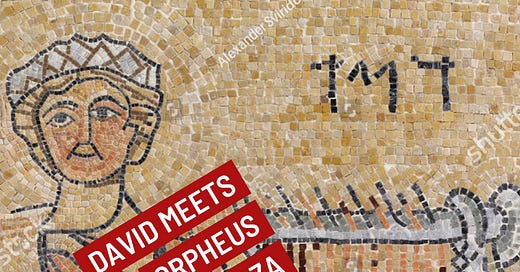An archaeological mystery meets musical mythology and political problems in today’s psalm.
Back in November 2023, a news story broke about Israeli soldiers praying at an ancient synagogue in Gaza City. It’s unclear what indeed happened, but knowledge of this 6th century CE Jewish house of worship in what was a thriving Jewish community for many centuries is quite well known. In 1965, when Gaza was under Egyptian rule, a story broke out about the discovery of this ancient temple - at first assumed to be a Byzantine church. One of the photos published by the Egyptian archaeologists displayed what they believed to be the figure of Orpheus, playing a lyre, surrounded by animals. But an Israeli archaeologist who spotted the story immediately saw the Hebrew letters above the figure of the player - the Hebrew name David - another famous harp and lyre player. Over time, the mosaic was removed to the Israel Museum for restoration, and these days it is on display at the Good Samaritan Museum right outside Jerusalem.
The fate of what was left of the old synagogue in Gaza City is unknown.
History, mythology and politics aside - for the moment - where this strange story takes us is the figure of the poet-king who played with strings and woke up each morning with the music of the spheres.
Today’s psalm, ascribed to David, tells the tale of his alarm clock and the power of music to wake us up - not only every morning. We’ve already seen this tale in earlier psalms.
The poet-king writes of how he is ready to sing his soul out for the divine - though it’s not clear in this next verse whether he also takes credit for waking up the dawn:
ע֭וּרָֽה הַנֵּ֥בֶל וְכִנּ֗וֹר אָעִ֥ירָה שָּֽׁחַר׃
Awake, O harp and lyre!
I will wake the dawn.
Ps. 108:3
Is it the king’s nocturnal music that wakes up the morning? Or a ambitious poetic way to talk about how he himself woke up as early as possible to make the most of each day?
The Babylonian Talmud’s Tractate Berachot comes up with this magnificent myth based on this verse:
“David had a sign indicating when it was midnight: A lyre hung over David’s bed, and once midnight arrived, the northern midnight wind would come and cause the lyre to play on its own. David would immediately rise from his bed and study Torah until the first rays of dawn.”
This Talmudic tradition led to the mystical custom known as the Midnight Transformation or of Tikkun Haztot. During these days of Elul, not just mystics wake up at midnight or in the early hours of the night to engage in prayer, mediation and often the chanting of the psalms in order to awaken the soul and to make each day more meaningful and present.
Interestingly, whatever we know of the ancient Orphic rites and rituals - those too also included nocturnal vigils, with strings strummed by priests and poets in order to awaken the spirit.
We may never know who was the original player portrayed on the ancient floors of the Gaza Synagogue, and we may not be the mystics waking up at midnight to wake up the dawn - but we can still appreciate the mystery of music as a human tool to transcend all divisions, helping us to navigate the darkness and turn on the lights of every single daily hope.
Play on, let music be the kindest force for peace and for our longed for healing.
Below the Bible Belt: 929 chapters, 42 months, daily reflections.
Become a free or paid subscriber and join Rabbi Amichai’s 3+ years interactive online quest to question, queer + re-read between the lines of the entire Hebrew Bible. Enjoy daily posts, weekly videos and monthly learning sessions. 2022-2025.
#Psalms #PSLAMS #Psalm108 #ספרתהילים #תהילים #BookofPsalms #כתובים #tehilim #Ketuvim #Hebrewbible #Tanach #929 #labshul #belowthebiblebelt929
#orpheus #Gaza #Gazasynagouge #mosaic #lyre #sacredmusic #davidandorpheus #Elul #orphism #musicofhealing #Teshuva #prepent2024 #peace #prayforpeace #nomorewar #hope #everywhere #peaceispossible



